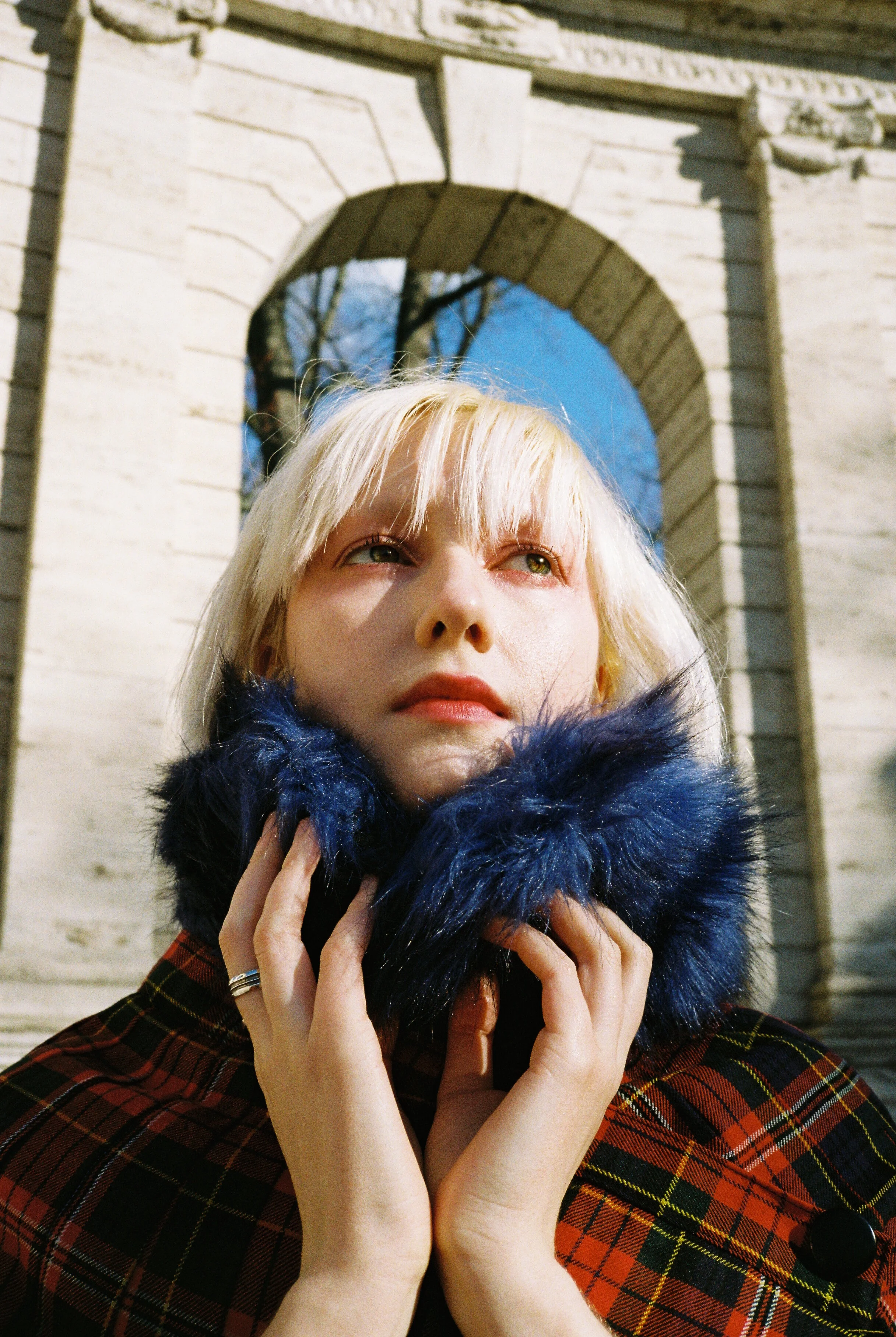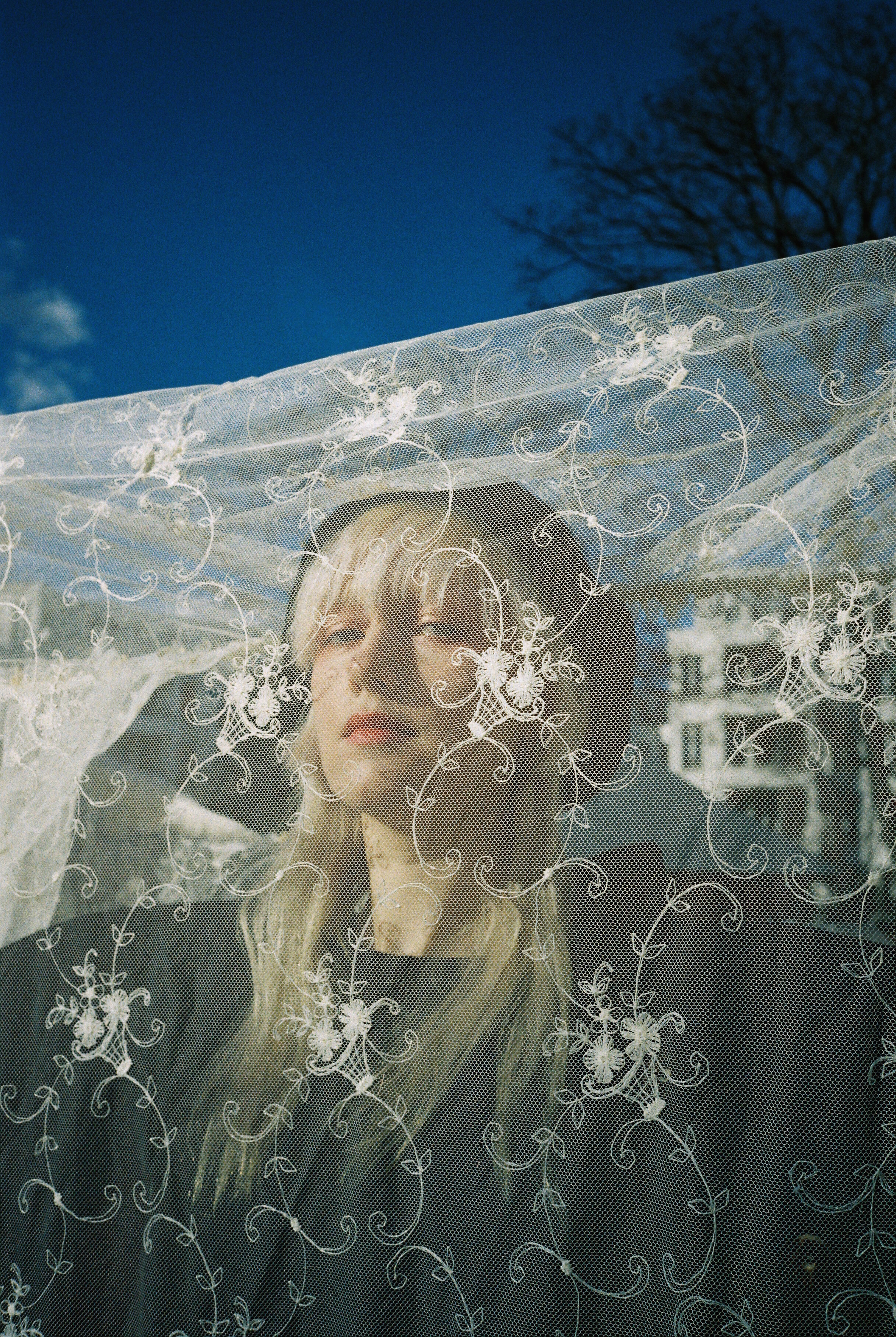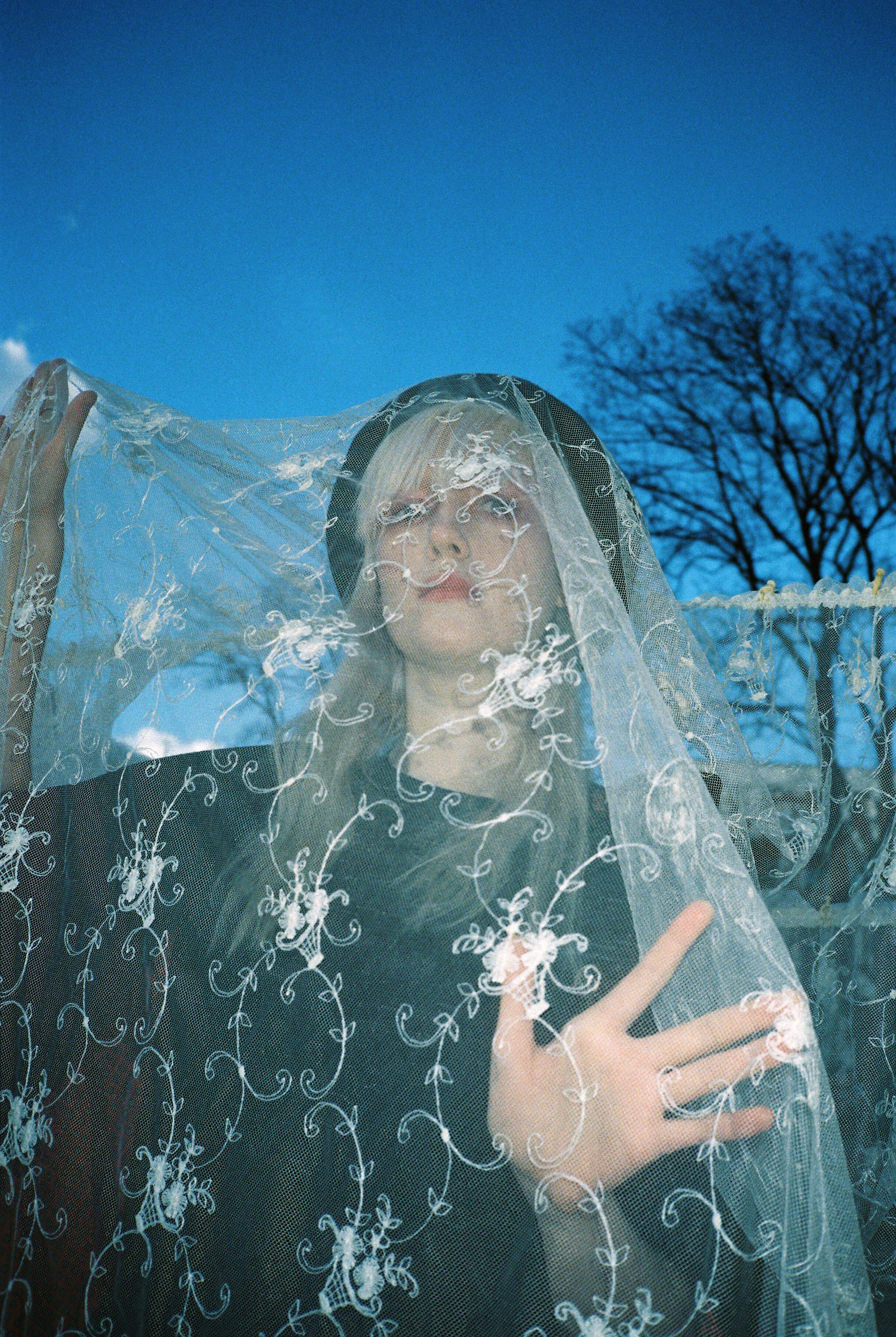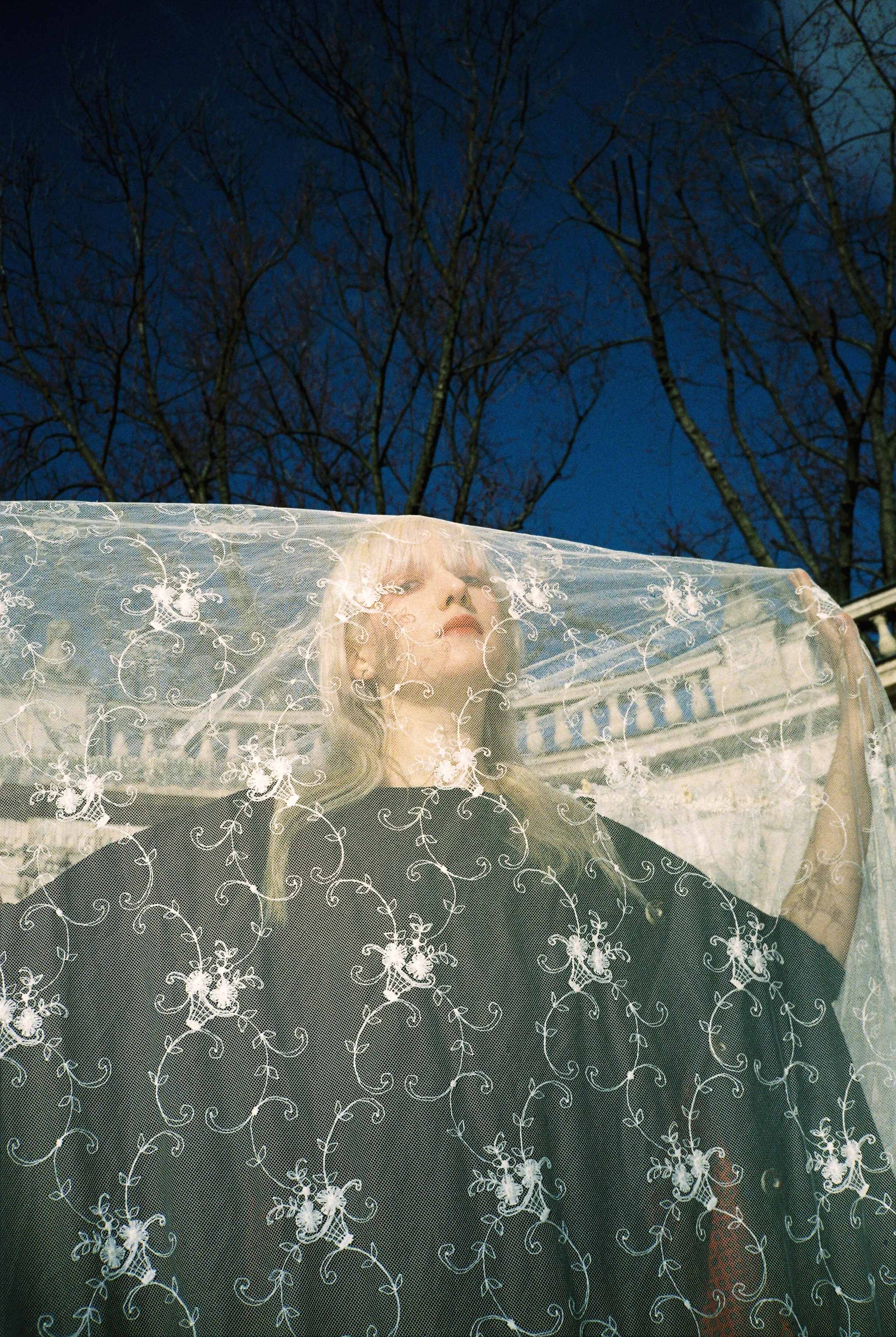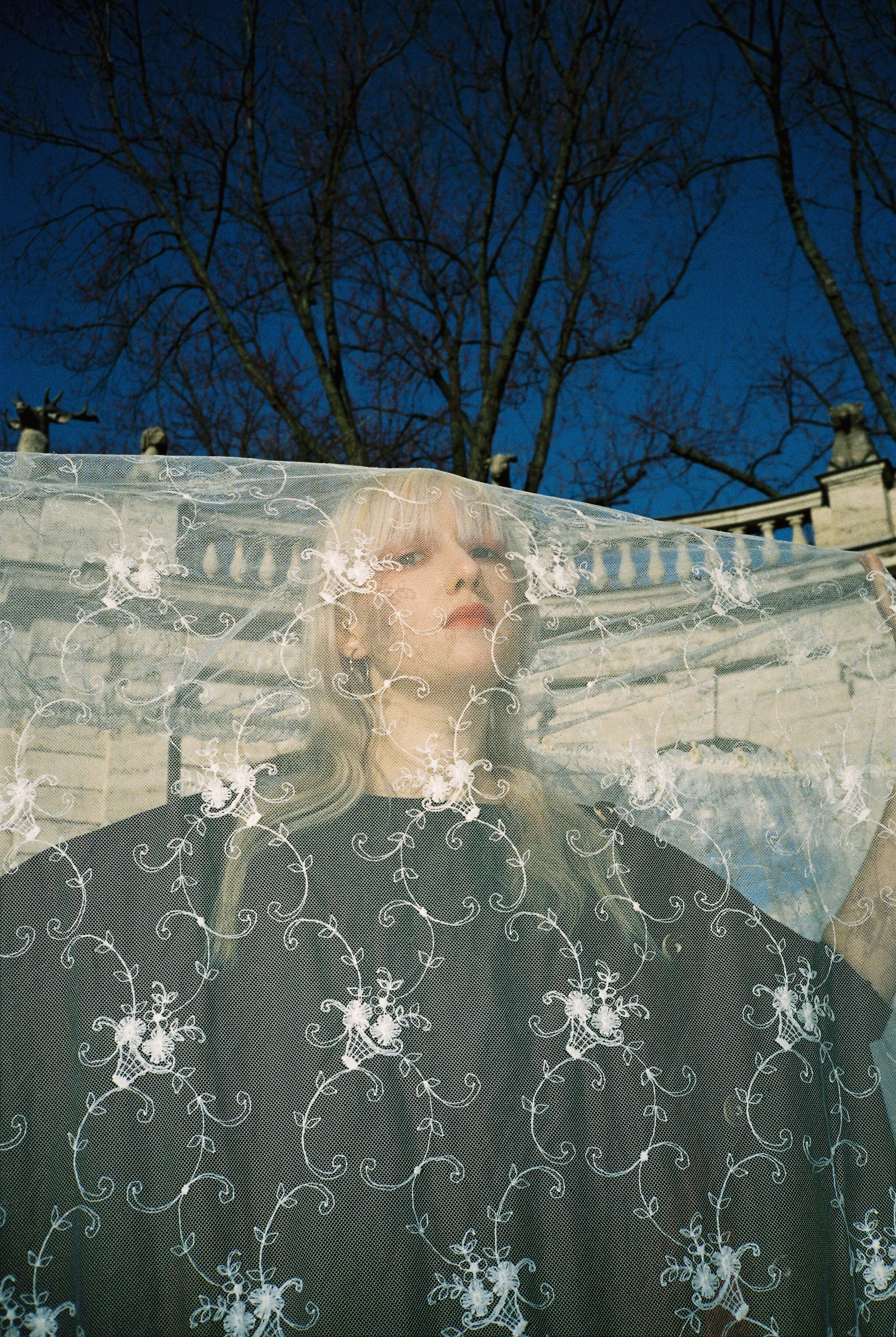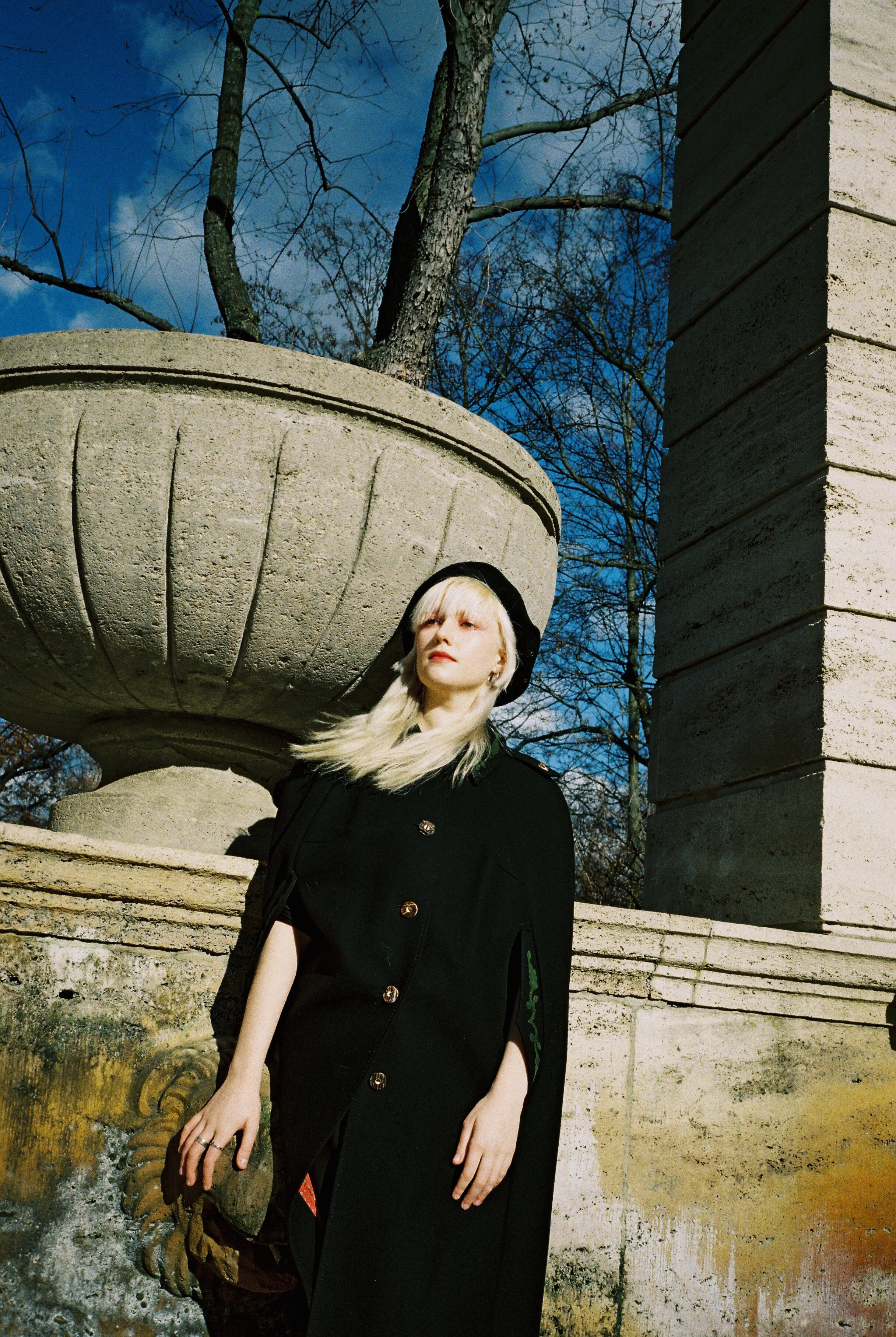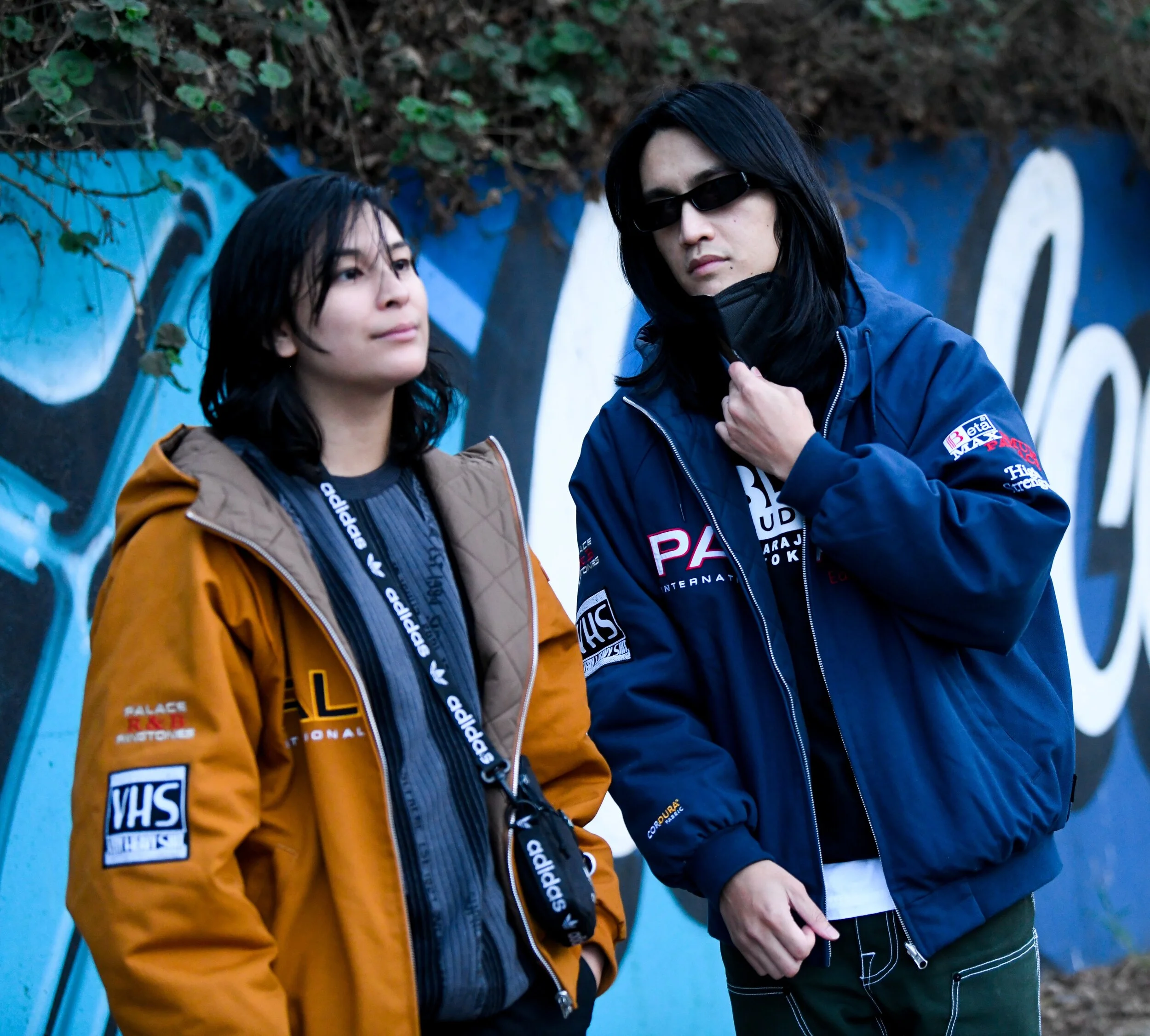Sally Dige Discusses Past Work, Videos, New Music, and More
Sally Dige has been steadily writing, recording, and performing her music for nearly a decade, and has gained a well-deserved international following as a result. Born in Canada, Sally has been based in Berlin since 2013, and although we’ve been especially eager to touch base with her following her 2020 single “It’s You I’m Thinking Of”, current travel restrictions prevented a face-to-face meeting. Undaunted by geographic challenges, we reached out to Sally, who graciously accepted our invitation to discuss her work.
Fortunately, lauded photographer (and longtime WMF friend) Miriam Marlene Waldner is also based in Berlin, and was able to snap the beautiful and exclusive photo set that accompanies the following Zoom interview with Sally. We’re excited to share the following extensive conversation, which covered past Sally Dige releases, her remarkable video work, upcoming music, and more.
Bobby Weirdo: You met Miriam Marlene Waldner and took photos to go with this interview. Was that fun?
Sally Dige: Yeah, it was great. That was the first time that I met her. She’s very creative, and it was a fun experience working with her.
BW: Did Miriam have specific ideas for the shoot, or was it totally improvised?
SD: We met at a location she suggested, and she brought some props: a backdrop and some clothes and costumes. She was good. Sometimes photographers just say, “I don’t know – do something!” and don’t give direction, but Miriam had ideas.
BW: I’ve been doing some work with Super 8 film lately, and that’s made me think of you and some of the music videos you’ve shot with Super 8.
SD: That’s great. It’s such a different experience when you’re shooting with Super 8 – you look at composition differently. It makes you really appreciate it, and think about a shot versus overshooting.
BW: Thinking of older DIY media, it’s funny when you consider all the important moments in life that people usually didn’t have an opportunity to document, and now it’s flipped – we document so many of the unimportant parts of our lives. It’s strange.
SD: Yeah, it is. Especially when we compare it with TikToks, bloggers, or YouTubers. There’s so much content all the time.
BW: What is the history of the Dige name? Where does that come from?
SD: Dige is Danish. My father’s side of the family were Danish farmers, going back forever. They were very traditional farmers – the oldest male would inherit the farm, and the women would also marry other farmers. The last farm was passed on to my father, and our farm had been in my family since my great-great-etc grandfather built it in the 1700s. And [my family] came from other farms before that.
My grandparents were very strict on preserving traditions, and they wanted to give a middle name to their kids that related to the farm and connected to our lives, because no matter where we go, we will always be connected to the land and soil which has been our family's life and history. “Dige” is a stone wall around a farm, and that name just continued in the family. I also sometimes see “Dige” as a middle name, and surname in Denmark, but it's less common.
I was in a band, and just going by my name Sally Jørgensen. I wanted a separation from that for my solo project, and I decided to go by Sally Dige because I do take a lot of inspiration from my family history, the farm, and their stories. So that’s how the name came about, but looking back it’s maybe not the smartest name [to have chosen]. Although very short, it’s confusing because of it's pronunciation and origin. In simplest terms, [the pronunciation is] “Dee-Ah”.
BW: What kind of farming did your family do? Was there a particular focus, or did it change over the years?
SD: They worked with cattle, dairy, pigs, chicken, wheat…a hodgepodge. Livestock was one of the main things, though. My dad was supposed to take over the farm, but then it eventually died out because of inner family conflict. My aunt wanted to take over the farm and run it, but my grandparents wouldn't allow this because she is a girl. The tradition goes that the farm be passed on to the eldest male, meaning by default the farm belonged to my father.
My father didn't want to be a farmer because he didn't like killing animals – even if it was already decided since birth that he would be a farmer – resulting in him never getting an education further than farming school. He ended up taking an offer through his school to work on a farm in either New Zealand or Canada. He chose Canada and from then on he resisted going back to fully take over the family farm. He has struggled with guilt and denial all his life for this reason.
My grandparents were now in the situation of having two children who pushed away a long-instilled tradition. My grandparents later offered my aunt to take over the farm, but it was too late. She had by then moved to the city and pursued a different life.
In the end, we had to sell it, which was sad, because it was the end of an era. We also donated all our land to the wildlife to grow freely – it felt more symbolic this way. It meant that we -- and everyone else -- could still walk on the fields that carried us for generations. As my grandparents said, “this land and soil has given us life” so we gave it back to where it all started - the earth. Every time we are all together in Denmark, it's almost customary that we have to drive to the farm, park the car and just stare at it in silence. It’s funny, because every time I’m talking to someone, I’m always talking about farms!
BW: Despite the Danish background, you grew up primarily in Canada…
SD: I was born in Vancouver, B.C. – West Coast!
BW: What was your experience with music and art there, growing up?
SD: When I was a teenager, there was a great underground music scene. It was a cool time, because there was a group of weird, arty, strange bands forming. There was a space a lot of those bands would play called The Emergency Room. There is a documentary, No Fun City, and a compilation LP Emergency Room. Vol:1 about it. Like anything else, it became too popular, which ruined the essence of it, and it died off…that's always the cycle.
But it was a cool time, especially when I compare it to Berlin, because it brought all these different people and styles of music together. Berlin is a big city, but all those groups are segregated [here]. You don’t see people from those different groups mingling.
But because Vancouver is much smaller, you had a space where all the alternative weirdos would come together. It was a real mix of bands, and a lot of them came out of that scene and became mainstream bands. Everyone was learning from each other, experimenting, and trying new things.
BW: You’ve said before that you lived in the woods of Sweden with hippies. When was that, and what was it like?
SD: We were always going back and forth between Canada and Denmark, because we still had the farm to take care of, and my grandmother who lived on the farm. My mom was always exploring things, and she’s a visual artist who does a lot of ceramics. We would stay in Denmark, and one time we took a summer trip to Sweden. She was always dragging us along to these kinds of things when we were kids.
There was a group of hippies in Sweden who worked with ceramics, and she wanted us to go there and stay. They had makeshift kilns in the fields. It was an interesting, eye-opening experience seeing people who lived differently, come together, and were dedicated to art and craft.
BW: Looking at more recent history, is it accurate to say that “It’s You I’m Thinking Of” was the last creative project you did before the pandemic hit? You put out the single and video in January of 2020…
SD: It totally is; that was so long ago. Like everyone else, I had a whole plan in my mind, and everything was lined up. Then, with the Corona situation, everything went into slow motion. Things just weren’t lining up, and they started to fall apart.
The original plan was to just do one single, release it, and do the next. When the pandemic hit, everything was so slow I [didn’t know if I] could even get tracks mixed, since I couldn’t meet people in the studio. So I changed my plan to just finishing the album. But everyone’s in the same boat – people had tours and plans, but then had to rearrange everything.
So that was the last thing I got to put out before the pandemic, and now it seems so long ago, but I am planning the next single and video now, so hopefully I can put things out soon.
During the pandemic, I did a song collaboration with Thorsten Quaeschning of Tangerine Dream featuring my vocals for “Gabriel's Message (The Angel Gabriel from Heaven Came)”, which was released last Christmas. I used to say “I will never do a Christmas song” but as they say, “never say never.”
BW: You mentioned videos, and I wanted to ask some questions about some of the older ones you’ve done. You’ve said before that dreams are a source of inspiration for your work. Do you keep a dream journal, or how do you remember dreams so that you can incorporate them into your work?
SD: Sometimes I get into the habit of getting up and writing my dreams down, especially if there is something that is really interesting or has some depth to it. I’ll write down all the details, and how I was feeling in the dream. Some dreams just leave such an impression that you think about them over time, and I let those just sit like a stew. The longer they sit, the more the flavors come out, and something develops from that, or I see them more clearly reflecting a deeper narrative within myself. That’s often how I think about my narratives.
BW: The scene in The Great Rock 'n' Roll Swindle where Sid Vicious sings “My Way” was an inspiration for your “Holding On” video. What is it about that film or scene in particular that inspired you?
SD: I never thought I would [want to] recreate a movie scene, but if I were to do one, it would be that one. I didn’t see that movie until really late. I first found the book The Making of The Great Rock 'n' Roll Swindle by Joel McIver at a garage sale. It painted a picture in my mind of not just making the film, but the film scenes itself. I remember it left an impact on me, but I still hadn’t seen the film. I went to all the alternative movie stores around town, but couldn’t find a copy of the film and the one library in town who did have a copy of the film, turned out it had been stolen. Online ordering wasn’t really a thing [at this time], or maybe I just didn’t know how to find it.
But I had the images in my mind from the book explaining the scenes, and I carried those mental pictures and stories with me for so long. I may not look the part, or wear all the clothes, but I've always seen myself as a punk. The core essence of what I understand punk to be is how I have always lived my life. Ironically, I've always been rejected by the 'punk circles – the ones who wear the fashion – because I was too different and weird to be accepted in that group. To me, that isn't what punk is about.
I connected the “Holding On” music video with being DIY and punk [which is] how I live my life, and it just made sense for me to recreate that scene, switching the gender roles. I also had other deeper connections and reasons at the time for recreating that movie scene – but I can't remember now what they were.
BW: “Holding On” was used recently at a Russian pole-dancing event. Did you ever find out how that happened?
SD: I only found out because I was tagged online. It was interesting – all these women had a competition, and I appreciated that she liked the song and used it.
BW: Did you get a lot of reactions to the “Hard to Please” video?
SD: Yeah, but I get a lot of reactions in general to my videos. I usually don’t read my video comments, because – like everyone else – you see the negative comments, and that’s all you think about. It upset some people in my family, but whatever…I’m not making films for my family. And when I say “my family,” not my immediate family. They are supportive (except my dad – he is ashamed).
The video that upset more people was “Emptiness”, but it was only men who were upset. One editor of a popular music magazine – also a man – harassed me for a few years because of that music video, but that's a whole other story with its own legal tales.
BW: Going way back, musically, the “Doppelgänger” seven-inch is on a Greek label. How did that come about?
SD: It was released on Fabrika Records. I was on a compilation cassette [Forward + Rewind: The Future Echo Tapes] released by aufnahme + wiedergabe that had all these minimal wave bands from that time. Fabrika was connected to that scene, so I wrote them an overly-confident email about how I was on that cassette, not realizing that the label is run by the band Selofan, which also appeared on that cassette. They were happy to release two of my tracks on a seven-inch.
BW: You’re thorough about acknowledging musicians in your songwriting credits, even crediting them for writing parts, as opposed to just playing parts on instruments like drums, guitar, and bass.
SD: True.
BW: There are different ways of looking at how to break down songwriting credit, and I was curious how you arrived at the way you look at parts versus songwriting.
SD: Yeah, and sometimes I feel like I’ve overly credited some songs, where I thought [later], “Man, really I just wrote that.” But I don’t want to feel like I’m leaving people out, or using them. I want them to feel that they are appreciated, but I know the music industry is weird with all that. Some people don’t feel they should be credited, but I want people to be happy in the end.
So that’s something I’ve tried to do from the beginning – make people feel they are appreciated, even if their contribution was something small. What do you feel about that?
BW: It’s an interesting situation – I think it’s a case-by-case situation. There are certainly groups where the parts and playing are the most important elements of the music’s composition. Sounds can be everything in some groups, so that might count as composition in those cases.
Especially when you get into sampling, and other artists are using sounds of a particular instrument or part from an earlier song, it gets complex. Other times, I feel the song is more or less complete, even before – or without – the parts that are added. Those elements might fall under arranging. It’s complicated!
SD: Yeah, I think I may need to get stricter, going forward. “Stricter” is a weird word, but I’m still learning about this. I just spoke with a friend who’s going through her own conflict with credits and percentages on a song collaboration she did with another artist, and I don’t fully understand the breakdown.
In the past, I’ve put myself last, even if I wrote the whole song, which may not have been the best idea. But because I’ve been questioned so many times if I’ve had someone else write or produce my songs, I don’t think people always thought I had much of a contribution to my own tracks. But I’ve spent hours, weeks, months – sometimes years – writing, recording, producing, and working on my songs at home, and a lot of people don't see me in it. And that’s maybe because I’ve been so relaxed [about credits], so now I’ve been trying to distinguish when I’ve written, programmed, and arranged the drums, even if a live drummer doubles it with acoustic drums. So I’m trying to get better at acknowledging and appreciating myself.
BW: You started a Patreon recently. How is that going?
SD: I’m not on it as much as I should [be], because I get distracted managing so many things, but I’m trying to be more on it. I’m always wondering if it’s interesting enough to people, and I’m trying to find a way to stay on it and make it interesting.
BW: In 2017 and 2018, you opened up for Franz Ferdinand, which I think is an unexpected pairing.
SD: Oh yeah! I did that, because I was in Vancouver at the time. My old label– who put out my Hard to Please album – and Franz Ferdinand are both from Scotland and know each other.
BW: That’s Night School Records, right?
SD: Yeah. So Night School said Franz Ferdinand’s drummer wrote to him and asked if I would open for them in Vancouver. So they requested that I open for them, and that’s how it came to be. I opened for them at two shows in Vancouver, and then I just became friends with them. I was also in Copenhagen, Denmark when they were playing there, so I opened for them there as well.
BW: Speaking of sharing bills and Night School, you’ve played with Molly Nilsson at least once in 2015, but you haven’t crossed paths with her that many times, even though you live fairly close to each other in Berlin, right?
SD: The first gig I played with Molly Nilsson was in Vancouver, and we also played together in Vienna, Switzerland, and Berlin. Four times, I believe. It's true though, we only cross paths when we play gigs together, even if we lived for a long time in the same neighborhood.
BW: A lot of artists in our world here at WMF are living and playing in Berlin these days: you, Molly Nilsson, Drab City, and Tim Koh, just to name a few…and do you know Farao and Special-K from Ultraflex?
SD: Yeah. Actually, Farao’s boyfriend Ådne Meisfjord mixed “It’s You I’m Thinking Of”.
BW: Before the pandemic, what did you think of the music scene in Berlin?
SD: When you’re a musician, it makes sense to live somewhere cheap so you can dedicate more of your time to your music. You can play a gig on the weekend and fly back to Berlin. There was so much stuff going on in Berlin – you could go to the goth night, the indie night, the queer art group night...
That’s what I was saying in comparison to Vancouver – Vancouver is small. Any alternative and weird groups naturally came together – Berlin is so big, and you can pick and choose. A lot of those scenes never cross-mingle [here] and that’s really a shame. People are stuck in their bubbles. As much as I can, I try to break through and meet people from different groups, but I do have friends that never cross over from their scene.
BW: I don’t know firsthand of course, but part of the appeal of Berlin that I often hear about is its affordability.
SD: I think for any artistic city to bloom, it needs to be affordable, right? When I read books about the 70s punk scene in New York, it was because you could still afford to live there and make art. [It’s about] being able to afford the time to create, because you can’t afford to create if you have to work all the time.
In Vancouver, you have to have so many jobs and work all the time. It’s amazing how people can still create [there] under that financial pressure.
BW: Do you feel free of that financial pressure in Berlin?
SD: Yeah, in comparison to Vancouver. Vancouver is very expensive, and I don’t think it supports artists. [That’s why] a lot of the serious artists have left Vancouver. Even though the city has gotten three times more expensive since I left, the artist’s fees are still the same, ten years [later].
Because of that, people are much more competitive with each other, so I think it’s better [here]. You can play shows easier here as well, whereas Canada is so big, and you have to drive so far to the major cities. The States is next door, but it’s hard for underground bands to get a visa.
BW: You’ve spoken about how you’re more interested in the emotion of the vocals themselves rather than the lyrics.
SD: When I write lyrics, I always start with the vocal melody. I’m just jamming with my voice to a song sketch, and I just use whatever words are in my mouth, just to get a sound. I [end up using] the words closest to the sounds that I’ve made, and the lyrics come organically.
It’s usually older folks who complain about not understanding the words, but what about the emotion?
BW: In that sense, I think lyrics are often overvalued. I don’t think that lyrics necessarily inform or reinforce what the music communicates on an intuitive level, but if you read most music reviews, the lyrics are often the primary focus, as if they are a shortcut to what the experience of the music is. But the music might take you somewhere that the lyrics don’t, I think.
SD: I’ve lost grants because of my lyrics. For certain grant applications, you have to include the lyrics [in the grant proposal], and I’ll get my usual letter of rejection from the institution with a sheet of the judges' critiques. Most of the time the critiques are that my lyrics aren’t good enough, or they just didn’t like them, or that they couldn't understand what I was singing. It’s hard in those situations, because the words aren’t my focus as much as the feeling and the melody, but how to win over people who think of music in such a rigid and old-fashioned way?
BW: It’s interesting that you bring up grants. On the one hand, grant funding is a great opportunity for artists. But on the other hand, it puts an artist in a funny position. An artist should be able to create without having to justify or quantify their work, but grants make the artist accountable in a way an artist doesn’t usually have to be.
An audience can like or not like an artist’s work, but grant funders understandably have feedback and can ask for explanations about the work from the artist. The artist has to fit the work into a box so that it relates to a grant’s purpose or theme, rather than just letting that work be whatever it naturally is.
SD: It’s true. Canadian grants are much more like a business, so they want to know that it’s profitable to invest in you. Berlin grants are better – they’re more open to ideas, small artists and being different. The Canadian ones favor the big artists, making it harder for the smaller artists to be given a chance, but I think it should be the other way around.
BW: Is there a grant you’ve received that led to a track or album you’ve done?
SD: I got a Berlin grant last year, which will be for my new tracks. But my previous work didn't have grant support. I’ve applied for Canada's main music grant for over ten years, but always been rejected, usually because of my lyrics.
BW: Speaking of your new music, “It’s You I’m Thinking Of” feels like a new direction for you. Is your upcoming, new material in that vein?
SD: It is in that same vein; it’s much less electronic. It’s more acoustic [with] strings, live drums, and more mandolin action. Holding On was entirely one synth, and very electronic, and after that album, I was sick of doing stuff on the synth. So I did the opposite and went back to the human sound [of] playing instruments instead of programming synths. It challenged me in new ways, and that’s where I’ve been going with these new tracks.
BW: What do you have planned for 2021 and 2022?
SD: I really hope I can start dropping new singles and videos. You never know with this Corona situation, but that’s my hopeful vision. Then I want to put out some physical releases. I may do an EP and then the album, but [either way] I want to start dropping the singles.
You can find more Sally Dige music here
